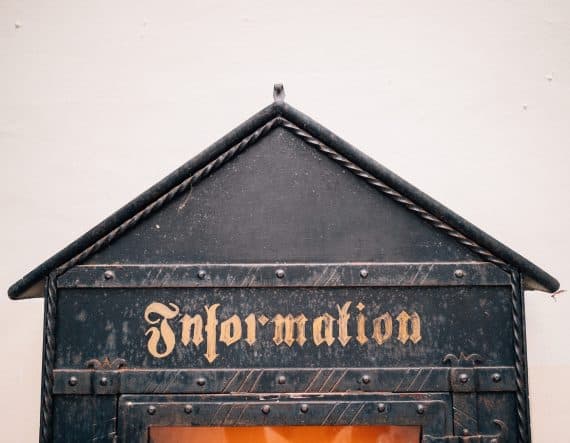How Do Closed Accounts Affect Your Credit?
Most of the time, when we talk about credit, we are talking primarily about the impact of open accounts. But are we underestimating the importance of closed accounts? Let’s shed some light on the less commonly addressed question of how closed accounts can affect your credit.
What Is a Closed Account on a Credit Report?
A closed account on your credit report is simply any credit tradeline that has been closed, whether it was terminated by the customer or the creditor.
There are several different reasons why an account may be closed.

If you don’t use your account for several months, it could get shut down for inactivity. Photo by Hloom on Flickr.
If you don’t use a credit card for several months, for example, you could get your credit card closed for inactivity. In this case, your credit report might say “account closed by credit grantor” for that account since the lender was the party who terminated the account.
Other reasons a credit card may be closed by the creditor include:
The credit card issuer is no longer offering that type of credit card or is replacing it with a different card
The credit card issuer determined that there was fraudulent activity on the account
The card was stolen or lost
Consumers may also want to close their own credit accounts from time to time, in which case the account might be notated as “account closed by consumer.” As an example, if one of your credit cards increases its annual fee or if you no longer feel that the fee is worth it, you might decide to close that account.
What Do Closed Accounts Mean on Your Credit Report?
Closed Accounts and Credit Utilization
Use our tradeline calculator to calculate your credit utilization ratios.
Now that you know what a closed account is and why an account may be closed, you may be wondering what a closed account on your credit report means for your credit.
The main impact of closing an account on your credit is the effect on your utilization ratio. By closing an account, you are reducing your total available credit limit, which could increase your overall utilization ratio if you have balances remaining on your other accounts.
Therefore, if you have balances on any of your other cards, you probably don’t want to close an account that is helping to keep your overall utilization down, as well as improving your ratio of low-utilization to high-utilization accounts.
On the other hand, if you pay down all your other credit cards to 0% utilization, you can safely close an account without impacting your credit utilization.
Try using our tradeline calculator to calculate your individual and overall credit utilization ratios and see how closing one of your accounts could affect your utilization rate.
Closed Accounts and Credit Age
Many people believe that once an account is closed, it will no longer count toward your credit age. However, according to an article by credit expert John Ulzheimer in The Simple Dollar, this is a myth.
“Credit scoring models like FICO and VantageScore do indeed consider the age of your oldest account and the average age of your accounts when calculating your credit scores. However, closing an account does not remove its history — including its age — from your credit reports.
Not only will the history of a closed account remain on your credit reports, but credit scoring models will continue to consider the age of the account as well. And, even better, a closed account continues to age. So, if you closed a five-year-old credit card today… in 12 months it’s going to be a six-year-old credit card.”
Are Closed Accounts on Your Credit Report Bad?
Closed accounts on your credit report are not inherently a bad thing. In fact, they can often be a good thing, as we will elaborate on below.
Closed accounts on your credit report, unless they are derogatory, are not bad for your credit. In fact, they are probably giving your credit a boost.
However, derogatory closed accounts can definitely have a negative impact on one’s credit.
For example, if you had a credit card closed due to delinquency, meaning the creditor closed the account because you had stopped paying it, the account likely still has a balance owed.
Having a closed credit account with a balance on your credit report could really hurt your credit. According to some sources, closing a credit account removes its credit limit, so a credit card account closed with a balance would be considered maxed out or over-limit.
Credit utilization is a major influence on your credit score, so maxing out your utilization by having a credit card account closed with a balance could result in a big dip in your score.
However, other sources say that a closed account with a balance will be treated as an open account until the balance is paid off, at which point you can expect some damage to your score, especially if you have balances on your other credit cards.
The specific way that closed accounts are treated may depend on which credit score algorithm is used to calculate your score as well as other variables in your credit profile.
Should I Pay Off Closed Accounts on My Credit Report?
If your account was closed with a balance but remains in good standing, maintain its good standing by continuing to make payments until the account is paid off.
If your account was closed due to delinquency, the first thing to do is call your credit card issuer to check the status of the account. If the debt hasn’t been sold to a collections agency yet, you’ll want to start paying off the account immediately to prevent it from going to collections. You could end up with bad credit if you have a collection account on your file.
If the account is already in collections, however, whether or not you should pay it off is an entirely different question that depends on your individual situation.
See our article on collection accounts on your credit report for more information on how to handle collections.
Open vs. Closed Accounts on Credit Report
In the tradeline industry, we often get questions about whether closed accounts have an impact on one’s credit and, if so, what value they hold relative to open accounts.
It is possible to have a good credit score without having any open accounts. Photo by CafeCredit.com, CC 2.0.
This is an important question, because generally when you buy tradelines you are an active authorized user for two reporting cycles, and after you are removed from the account, it will begin to show as a closed account on your credit report.
Therefore, it is useful to know what impact the tradeline might have after it converts to a closed tradeline.
From what we have seen, closed accounts often can still be a very powerful influence on one’s credit score.
Remember, the age of a closed account still factors into your credit, and accounts continue to age even after they have been closed. Age and payment history go hand-in-hand and together make up 50% of a FICO score, and since closed accounts can still contribute to these factors, this implies that closed accounts can still have a strong effect on your credit.
However, closed accounts may have a diminishing impact over time, since credit scores tend to prioritize recent events.
Can You Have Good Credit With Only Closed Accounts?
It is possible to have a good credit score while only having closed accounts in one’s credit report. We have seen examples of people with credit scores in the 700’s who only had closed accounts in their credit file.
Can I Have Closed Accounts Removed From My Credit Report?
If you have closed accounts on your credit report that are not delinquent or hurting your credit, then there is no need to remove them. They may actually be helping your credit, even though they are closed.
Accounts that were closed in good standing should automatically fall off your credit report after 10 years, while delinquent closed accounts will fall off your credit report after 7 years.
How to Get Rid of Closed Accounts on Your Credit Report
If your credit card has been closed, you can try calling your credit card issuer to ask if the account can be reopened, but don’t wait too long.
If a closed account on your credit report is reporting inaccurately, then you can dispute it and have the credit bureaus update the account with the correct information or remove it.
Contact each credit bureau or check their websites for instructions on how to dispute accounts on your credit report.
If a Credit Card Is Closed, Can It Be Reopened?
In some cases, consumers may be able to reopen closed credit cards.
If your account was closed due to fraud or delinquency, banks typically do not allow these accounts to be reopened.
If it was closed voluntarily on your part or closed due to inactivity, however, you might have a chance to reopen the account if you don’t wait too long.
Only some banks will allow this, and those that do have varying time limits as to when you can reopen an account, so check with your credit card issuer.
If you’re within the time window and your account is eligible to reopen, here’s how to reopen a closed credit card account:
Call the phone number provided on the back of your credit card (or if you don’t have the physical card anymore, look up the phone number for the customer service department for that card).
Be ready to provide your personal information and answer security questions.
Explain why you closed the account and why you are requesting to reopen it.
Some issuers may require a hard inquiry before they can approve your request, which could cause a small, temporary drop in your credit score.
If your bank doesn’t allow you to reopen the card, the next best solution might be to re-apply for the same card or apply for a new credit card altogether.
Take-Home Points About Closed Accounts
Accounts may be closed voluntarily by the consumer or closed by the creditor due to inactivity, fraudulent activity, or delinquency.
Closed accounts are not necessarily bad and can even help your credit.
Closing an account could affect your credit utilization.
Closed accounts still contribute to your credit age and they continue to age even after they are closed.
Closed accounts can still have a powerful impact on credit scores.
Continue paying off accounts that were closed with balances to prevent them from going to collections.
You can dispute closed accounts that are not reporting correctly.
You may be able to reopen a closed credit card account depending on the circumstances.
Read more: tradelinesupply.com








